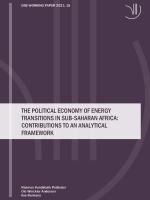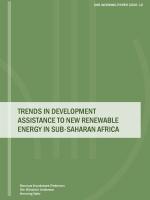Energy transitions in Sub-Saharan Africa are about more than mobilizing finance

At the recent COP26 Climate Change Conference in Glasgow, much attention was paid to mobilizing public and private finance to produce clean energy in the developing world. However, the relevant Sustainable Development Goal 7 (SDG7) is about more than just cleaner energy.
Its aim of ensuring ‘access to affordable, reliable, sustainable and modern energy for all’ includes more goals that are not always easily compatible. Evidence from sub-Saharan Africa suggests that more progress has been made in improving access to energy services than in ensuring the reliability of energy supplies and the sustainability of energy production. Transitions to more sustainable forms of energy are charged with political questions about how to balance these different goals.
In our recent paper on the political economy of energy transitions in sub-Saharan Africa, we identified three lessons. First, support is needed for entire energy systems, not merely for selected technologies. If badly planned, wind and solar projects may undermine the reliability of energy supplies and the economic viability of public energy utilities. Furthermore, recent contributions to the literature on the energy transition have pointed to the decisive role of politics and power when either promoting or preventing the deployment of renewable energy.
The domestic and international actors involved in producing energy from existing, less sustainable sources of energy often negatively influence the deployment of non-hydro renewable energy. However, there may also be actors supporting its promotion. Little understood public and private interests influence decisions. Careful country-level analysis of such competing interests and working with entire energy systems are therefore key.
This implies that development donors promoting a transition to more sustainable forms of energy should support renewable energy not in isolation from, but as part of, broader energy sector development. The building of administrative capacity and awareness of choice have been identified as forming a promising approach to supporting climate change mitigation and could be expanded to energy-sector development as a whole.
The often highly politicized decision-making processes in the energy sector that can be observed in many countries suggest the need not only to support energy-sector planners in ministries and utilities, but also to adopt a sector-wide approach that involves support for research, organizations in the sector and other relevant decision-makers. This also applies when donors collaborate with private investors.
Secondly, countries’ resource endowments should be the point of departure for support. For instance, a country like Kenya, which has few commercially viable fossil-fuel resources, has successfully developed its geothermal resources. Concerns over energy security and a focus on developing indigenous sources of energy can be observed in many countries, but their outcomes differ from one country to another. Resource endowments have hitherto decisively influenced the potential for energy transitions.
There is a remarkable correlation between the availability of fossil-fuel resources and the choice of energy technologies. Countries like Nigeria, Ghana and Tanzania, which have significant commercially viable oil, gas and/or coal resources, have included little non-hydro renewable energy in their energy mixes. Countries like Ethiopia and Kenya that lack fossil-fuel resources have shown a greater interest in developing their renewable sources of energy.
Support strategies should therefore reflect the particular country’s own resource endowments. If a transition to more sustainable forms of energy is the goal, continued support to the development of non-hydro renewable energy is required, as are diversified approaches and a willingness to work across energy sources and technologies.
Thirdly, the access agenda provides a window of opportunity for promoting non-hydro renewable energy. In recent decades, significant gains have been made across countries when it comes to improving access to modern energy in sub-Saharan Africa. As access increasingly became a joint priority of governments and donors in the 2000s, access rates began climbing, from 34% in 2010 to 47% in 2018 according to UN's Energy Transition Report 2020.
A few empirical analyses point to the potential links between resource endowments and improving access, but more research is needed. Overall, countries with significant commercially viable fossil-fuel resources are inclined to use these to improve access. Conversely, countries without such resources have shown a greater willingness to develop forms of renewable energy.
As access rates climb and energy production increases, there will be openings for developing non-hydro renewable energy in both types of countries. There are, however, tradeoffs that touch upon country-specific state-society relations and social contracts. How are decentralized solutions using non-hydro renewable energy viewed vis-à-vis connections to the central grid?
What should be the balance between public and private actors? Is it acceptable to raise electricity prices to attract investments in non-hydro renewable energy? How do higher prices affect access for the poor? How can potentially negative impacts on local populations from renewable energy projects be avoided? Flexibility and careful attention to the domestic political economies of energy are required.
This DIIS Comment has received financial support from the Ministry of Foreign Affairs of Denmark. It reflects the views of the authors alone.
DIIS Experts





